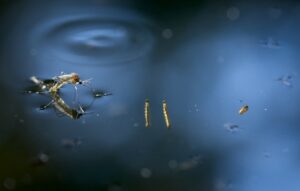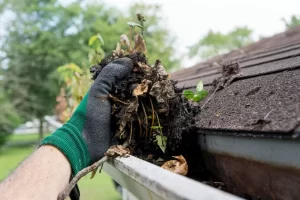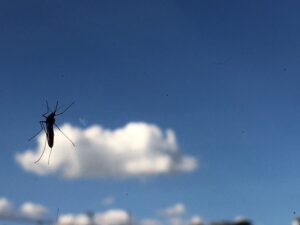READ ALL ABOUT IT
CHECK OUT OUR BLOG FOR CHICAGOLAND & SOUTHERN WISCONSIN
When Do Mosquitoes Come Out
From having to constantly swat certain bugs away and hearing a certain irritating high-pitched buzzing, you’ve likely noticed that mosquito season is upon us. Knowing when mosquitoes come out is a great way to prepare your home for when these pests become more active.
Mosquito Season
Mosquito season refers to the time mosquitoes are most active, and thus become a pest for humans trying to enjoy their time outdoors or trying to avoid mosquito bites. In Illinois, mosquito season tends to start in mid-April and end around October. This means mosquito season encompasses all of the summer, as well as the warmer parts of spring and fall.
During these times, temperatures are around 50˚F overnight. These pests love warm weather and are most active at around 80˚F. They are also often attracted to damp, moist areas where they can lay eggs and reproduce.
The mosquitoes that actually pose a threat to humans are the females, as they require blood to produce eggs. Male mosquitoes are less of a direct problem, as they instead feed on nectar for survival. Though they may still be attracted to people in an attempt to meet a female, which can still make them a nuisance. The biggest role males likely play in mosquito season is being a viable partner for females to reproduce with, and therefore give rise to more mosquitoes.
Illinois Mosquitoes
There are generally two types of mosquitoes that are found in the Chicagoland area. First are floodwater mosquitoes. These type lay their eggs in areas they know will be flooded later. Once heavy rain arrives, these eggs begin to hatch. While floodwater mosquitoes can be serious biters and travel long distances, they are not known to spread disease in Illinois.
Vector mosquitoes cause problems because they are named for their ability to carry diseases. These mosquitoes leave after laying their eggs in stagnant water, from the water in an old tin can to still-standing sewage ponds. One vector mosquito, the Asian Tiger mosquito, is active during the day and is especially aggressive, making it important to protect yourself against its bites.
The Dangers of Mosquito Season
It’s important to remember that when they come out, they can bring various diseases to people in Lake County with them. Malaria, dengue, Zika, and West Nile virus are the diseases most commonly associated and spread by mosquitoes. Because of their potential to spread disease, mosquitoes are often called the deadliest animal (to humans) in the world. But it’s not just humans at risk of mosquitoes, as they are also known to bite some pets, especially dogs. They aim for parts of a dog that is less covered by fur. Most of the time, these bites just cause itches, but they can sometimes lead to heartworms, causing immature worms (microfilaria) to get into your dog’s bloodstream. Mosquito season is about protecting yourself and your loved ones from these pests.
Mitigating Mosquitoes
You can do a few things to try to handle the mosquito problem on your own. There are lots of things you can do around the house, especially the yard, to help keep mosquitoes at bay, such as keeping your yard clean and without trash, as well as cleaning gutters and other low-lying areas to limit still-standing water.
Once mosquitoes get inside the house, that’s often a more difficult problem to solve as they become hard to catch and have lots of places to hide. Coupled with mosquito traps or essential oils often come with some caveat or a lack of efficiency, the most effective way to handle mosquitoes is to have a professional mosquito control service handle the job.
Mosquito Repellent Product Options
Various options are available for mosquito repellent products that can help deter mosquitoes. Examples include citronella candles, sprays, coils, and bug zappers. These products offer varying degrees of success, so it may be beneficial to experiment with different options to determine the most effective for your property.
Maximize Your Mosquito Repellant Performance with Skeeter Beater
To optimize the performance of Skeeter Beater with a secondary attractant, consider incorporating a complementary attractant for enhanced trapping efficiency. Utilizing a secondary attractant in conjunction with the trap can potentially boost the catch rate by up to 10 times. Select from EPA-registered attractants tailored to target specific mosquito species prevalent in your particular region. For instance, options like Octenol and R-Octenol are specially designed to attract different mosquito species found in coastal areas, the northern U.S., and Canada. By strategically using a secondary attractant that aligns with the prevalent mosquito types in your location, you can effectively enhance the capabilities of Skeeter Beater.
To achieve the best results with Skeeter Beater, it is recommended to initiate your mosquito control strategy as early as possible, ideally before the breeding cycle reaches its peak. The ideal time to begin using Skeeter Beater is when the temperature starts to rise above 50°F. By implementing the trap at this stage, you can effectively capture newly emerging mosquitoes before they can gather in large numbers. The trap is built for continuous operation, enabling you to trap mosquitoes as the mosquito population grows over time consistently.
Mosquitoes are naturally drawn to these elements, seeking warmth, moisture, and carbon dioxide, typically found in human breath.
When handling mosquitoes, it’s crucial to consider disrupting their breeding cycle to reduce their population effectively. Your article emphasizes the challenges that arise when mosquitoes find their way indoors, making them harder to catch and giving them plenty of places to hide. It also points out the limitations of traditional methods like mosquito traps or essential oils, which may not always be efficient in controlling these pests. While it suggests that enlisting the help of professional mosquito control services can be the most effective solution, it’s important to explore alternative options that target the root of the issue. By disrupting the breeding cycle of mosquitoes through methods like continuous use of specialized traps, such as the Mosquito Magnet, you can significantly reduce the number of mosquitoes on your property and create a more comfortable environment.
Where Do Mosquitoes Come From
Mosquitoes may feel like they come out of nowhere, but they do often have a source: still-standing water. Mosquitoes spend most of their life cycle in the water, and they come out once they become adults to feed and reproduce. Once they’ve had their fill and are ready, mosquitoes lay their eggs in still-standing water, preferably in dark, damp places. This preference is why it feels like there are more mosquitoes after a spell of rain. Puddles created from rainfalls, still pools in ponds and streams, and small collections of water in old plastic waste, and tires are some favorite mosquito spots. In nature, mosquitoes also often favor swamps, still parts of lakes, treeholes, and any natural low point that can hold water.
But then where do the first mosquitoes of a season come from? Usually, these mosquitoes have hibernated through the winter in dark, hidden places. Once temperatures are warm enough, they become active again.
When Do Mosquitoes Go Away in Illinois
In Illinois, Mosquitoes tend to go away around mid-October, or whenever temperature drops below 50˚F for a week and more. Because mosquitoes are cold-blooded animals, they are unable to regulate their body temperature when the weather isn’t warm enough. Therefore, the cold makes mosquitoes go away, or (for some species) at least enter hibernation until it’s warm enough again. Some mosquitoes even have eggs that are made to last through the winter, allowing females to emerge from hibernation in the spring and repeat the process.
However, climate change, changing precipitation patterns, and warming temperatures means that we’re getting monstrous mosquito seasons that can now start earlier and end later. Climate change may also be increasing the range of mosquitoes, increasing their risk.
How can you avoid mosquitoes at night or during the mosquito season?
During mosquito season, to avoid mosquito bites, it is essential to keep your yard clean and free of trash and regularly clean gutters and other low-lying areas to prevent still-standing water. Additionally, utilizing mosquito-repellent products such as citronella candles, sprays, coils, and bug zappers can help deter mosquitoes. Consider using a professional mosquito control service to handle the mosquito problem effectively for optimal mosquito control. Remember that they are most active when temperatures are around 80°F, so taking preventive measures early in the season, like using a mosquito trap with a secondary attractant, can help capture them before their population grows significantly.
Engaging with experienced pest control professionals like Skeeter Beater at the start of the season is advisable to enhance your mosquito prevention strategy. Our experts can strategically spray around your property or provide pre-scheduled fogging services to effectively target mosquitoes. By tackling the problem before they emerge from hibernation or breeding sites, you significantly reduce the chances of infestation. Don’t wait for the first bite to remind you of the mosquito menace.
Why Do Mosquitoes Come Out and Are Active at Dusk and Night?
Mosquitoes are primarily active from dusk till dawn. This behavior is largely due to their vulnerability to sunlight. Exposure to the sun’s rays can lead to dehydration and can fatally harm these insects. Mosquitoes can avoid these dangers and thrive by staying active during the cooler, darker hours. This time also provides them with optimal conditions for feeding and breeding, making nighttime ideal for their survival activities.
Understanding Mosquito Activity Patterns: Why Are They More Active at Night?
Mosquitoes, known for their biting nuisance, have distinct behaviors that make them most prevalent from dusk till dawn. This nocturnal activity is primarily an adaptive strategy to avoid the harsh daylight conditions. Here’s a deeper look into why mosquitoes prefer the night:
1. Avoidance of Sunlight: Mosquitoes are more active at night to escape the daytime heat and sunlight. Prolonged exposure to the sun can lead to dehydration for mosquitoes, which is particularly dangerous considering their short lifespan of about one to two weeks. They conserve moisture and energy by limiting their activity to cooler nighttime hours.
2. Ideal Breeding Conditions: Mosquitoes are often found near stagnant water sources common in shaded or wooded areas. These spots provide ideal conditions for laying eggs and are typically cooler and less exposed to direct sunlight. Being active during the cooler, humid night hours aligns with their breeding needs.
3. Increased Efficiency in Feeding: At night, the stillness of the air aids mosquitoes in sensing carbon dioxide exhaled by mammals, a primary cue they use to locate their next meal. This is less effective during the day when air movement can disperse these signals.
4. Lunar Influence: Interestingly, studies suggest that the presence of a full moon may amplify mosquito activity by as much as 500%. The increased light during a full moon enhances mosquitoes’ visual navigation during their night-time feeding.
Understanding these factors clarifies why mosquitoes are more active at night, strategically avoiding threats and capitalizing on environmental conditions to thrive.
Spend the Season Mosquito-Free
If you’re looking to spend mosquito season without these biters flying around, Skeeter Beater has you covered. Our services are both residential and commercial, so whether you’ve got a restaurant patio or a backyard that needs some mosquito removal, we have a package and deal to suit your needs. In addition to handling mosquitoes, we also deal with ticks and fleas to help make sure that you can make the most of your summer. Contact Skeeter Beater whenever you want to make sure those mosquitoes beat it.




